TEA, Teachers of English in Austria – Keeping an Association Alive and Well
Candy Fresacher, Austria
Candy Fresacher teaches in companies and at the Advertising Academy in Vienna and also gives presentations at various conferences throughout Europe, Asia and America on the topics of emotional intelligence, time and stress management, motivation, assertiveness, and body language. In addition she has a number of volunteer positions; she is TEA Chair, Editor, ELT News. www.tea4teachers.org . E-mail: c.fresacher(at)kabsi.at, www.fresachersigle.at
Menu
History of the organization, and my participation
Typical events
Other associations
Needs of English teachers
Difficulties for other English Teachers’ Associations
Difficulties for TEA
Questionnaire results
Possible solutions
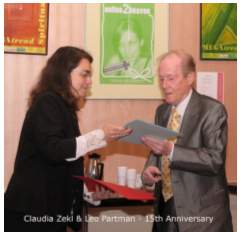
TEA, Teachers of English in Austria, is an organization that started some 16 years ago with the idea of assisting English teachers across Austria and across levels in networking with one another, in improving English teaching through continued education opportunities, and through access to events involving native English speakers. Many of the founding members were in the highest levels of teaching at universities and educational institutes in Austria. Membership in those early years was about 900.
And now it was about to end. We had no volunteers for open positions on the board and it seemed that no one was concerned except the outgoing members. My own history with the organization was also at stake. Although I had not been a member for the whole 16 years, if the board did not continue there would be no TEA at all and I thought it had a very valuable function.
Although 900 teachers may seem like a lot of members, it does not reflect a large percentage of the various English teachers in Austria – in secondary schools, universities, adult education, company courses and most recently in primary schools and kindergartens. The number of members has been steadily declining and now there are only about 300. But when I joined I wasn’t aware of these facts nor did I care.
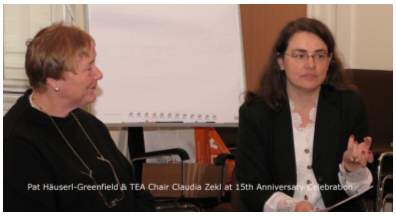
Two years ago, when I joined the TEA board, it was considered essential to find out what the TEA members wanted of the association. It was felt that the need for events connecting teachers with native speakers was long passé, since there were more and more opportunities to meet native speakers throughout Austria on an informal basis. Workshops and conferences were needed and wanted. The publication of our journal, the ELT News, was also felt to be relevant. However, we sent out a questionnaire to our members to see if what we felt, as a board, was what our members wanted. One member’s reaction showed that we were right: “As a freelance teacher, I feel TEA’s key role is to give me contact with other teachers”.
I myself had only joined the board on a whim. I had some extra time in my schedule after completing my Ph.D. and a lighter teaching load. Although I had been a member of TEA for some years I was very like the profile of our usual member. I was interested in what was offered to me on a plate – maybe. I joined TEA because I thought that as an English teacher, I should belong to an organization which represented my profession. I wasn’t overly concerned about how the organization worked or how many members it had or what it did. But I thought being on the board might be a good way to “pay back” the profession for what I had received from my years of teaching. Little did I know what was waiting for me.
The results of the questionnaire we made were never published and never analysed in detail until recently. However, consensus of opinion after looking at the 23 questionnaires that were returned was that we were on the right track. That, indeed, our members wanted to participate in workshops, conferences and read the ELT News and any electronic newsletter we should send them. Even though I had never been interested in any of these activities…
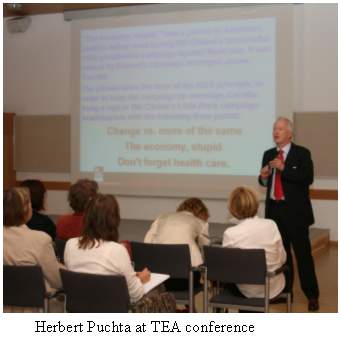
The encouraged board immediately set about offering various workshops to the members within the Vienna area and in other provinces. While workshops offered in Vienna had an attendance of between 10-20 participants, workshops outside of Vienna had only about 5 members.
This was hard on me as I had offered my talents and our seminars were on my favourite subjects of Emotional Intelligence, Time and Stress Management for Teachers. The question was, why did so few people attend? Was it that the publicity for our events was not good enough, the topic, me?, or overburdened teachers with little time, or some other reason we didn’t know?
Some other ideas we tried included evening workshops on holidays led by native speakers and slide show presentations and even a course in teaching belly dancing in English. Some ideas were more successful than others. For my California Dreaming slide show for teachers there were 5 participants and those who attended were happy with the information. Helmut Eckelsberger, a regular summer school attendee came up afterwards to introduce himself and explained “I enjoy all the TEA activities and am looking forward to next year’s summer school.”
Our conference, held in 2007 in Linz had a total of 43 sessions over 3 days and 170 participants and was very successful with such plenary speakers as: Mark Fletcher, Yvonne Pratt-Johnson, Herbert Puchta, Andrew Skinner, Jim Wingate, and Andrew Wright .. Also our summer schools in 2007 and 2008, a program we have each year with two native speaker trainers for four days, were successful.
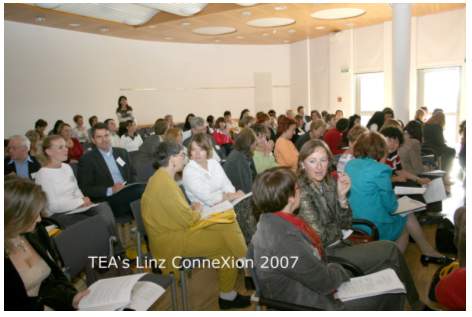
In October, 2008, a new board needed to be elected. The old board decided that they would make room for others with more enthusiasm and ideas to help keep the organization going.
Problems had occurred in the running of TEA in the two years I was on the board. People did not get along with one another and that made working together difficult. This is especially important when everyone is offering time and effort for free. Somewhere there needs to be motivation to continue. It was dissolving. Two board members left mid-term and our office assistant also quit. It was a difficult time and it was decided TEA needed to start over. All my talents of emotional intelligence didn’t seem to help or work. It was distressing. Also, despite a number of written appeals to our membership, only one person volunteered for a position on the board, even with the possibility that the association would have to disband.
In the end, three board members decided to try again. As a continuing optimist I felt that maybe with a new combination of people on the board we might be able to increase our membership and actually continue to be useful to our present membership. With the help of three new board members, TEA is now continuing.
Recently, upon attending a meeting with other foreign language organizations, I discovered that the Latin teachers’ association had a membership that represented between 80-90 percent of all Latin teachers in Austria, about 650. Another organization, made up of teachers of German as a foreign language, also had a high percentage of such teachers in their organization, totalling about 450. When asked what made them so successful, the Latin teachers’ official representative thought it had to do with the need to be sure that policy makers were made aware of the importance of teaching Latin – so that jobs were not cut. For the teachers of German as a foreign language, the economic factor was also considered important: the teachers were not being paid enough for their efforts.
As most of the English teachers in Austria are employed in state schools, the pay system cannot be highly influenced. And the increasing importance of English in the global community is something that can be seen relatively easily and is reflected in the number of schools that now offer bi-lingual classes with native speakers in mathematics and geography lessons to teach these subjects in English along with the German. So, unlike the Latin teachers, there is probably little need to show policy makers the importance of the English language. There would be a need for something to be done about the pay schedules for English teachers in the private sector. Some teachers are paid about the same amount as cleaning staff and still need to pay taxes on that amount. However, those teachers are not aware of TEA, and it has not been a vision of TEA to be of help at the economic, or policy making, level.
Additionally, the age of many secondary teachers is such that they are close to retirement. Some estimate that within the next 5 to 10 years many teachers (including English teachers) will be retiring and there will be a shortage. This also seems to be reflected in the age of TEA members as they are about my age – 57 – and close to retirement. I feel it would be very important for TEA to reach young teachers. But reaching that target group is difficult. Those who are graduating and have graduated already are having difficulties getting positions and so go into other fields. Those who do get jobs feel overburdened by all that they need to do in their teaching lives and so have no time for the activities TEA would offer them. However, most do not know that TEA exists.
It should also be mentioned that there is not a long tradition of being involved in professional organizations in Austria. It is not required nor looked favourably upon in a job application if you mention that you belong to an organization such as TEA. Many belong to the organization because of the various discounts we offer for bookstores and theatres rather than for the prestige of being a member of a professional association.
Although Austrians are well known for volunteering within their small communities for projects like their volunteer fire departments or other community actions, it is generally not as encouraged in the school systems as it is in some other countries. Therefore, it was perhaps to be expected that no one wanted to do the extra work involved in running the association by joining the board. At the moment our board has three members who are retired or semi-retired and our past Chair left because of other commitments. I think our new members are quite like I was at first. Yes, I’ll join the board, but please don’t give me much to do.
I also started off with small jobs. I was the “Business English” person since I had most experience in this area of English teaching. Then I was asked to proofread the ELT News – that also was not too difficult or time consuming. Then the editor of the ELT News left and handed the job over to – me! So that was a step up in what needed to be done. She also handed over her second activity, organization of the summer school to me as well. Now I was involved in a way I hadn’t anticipated when I started. Since then TEA has become an all-consuming part of my life. And not only my life – my husband must look after the home page, my son is consulted for more difficult IT questions, my daughter now does the layout of the journal as she is a graphic designer – and of course the board is involved in promoting TEA and its events and making connections and networks that will help us do our job better for more people. But as Chair, I have a huge sense that the responsibility for it all is in my hands, I have a feeling of commitment and the feeling that I need to motivate whoever I can so we can achieve our goals.
Does any of this sound familiar? Are there other English associations that are having the same difficulties? I know that our partner institute in Hungary has been having some difficulties, but our partner institute in Croatia has a large number of members and had over 500 participants at one of their more recent conferences. The Hungarians have now instituted a program in connection with embassies and other sponsors and are on the way to increasing membership. Which way should TEA go?
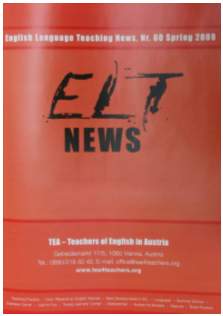
The problems of TEA are two-fold. First, many of those who might join TEA do not know about it. If they knew about its advantages they might well be persuaded to join. The price of a year’s membership is reasonable. We have not yet found a way to reach teachers in the private sector which includes language school teachers as well as those who independently run company courses. But also we would like to reach primary school teachers (who are now required to teach more and more English in their classrooms). Or, in addition, there are many native speakers who teach in kindergartens and primary schools’ afternoon programs and are hired and paid for through the parent/teacher associations.
The second problem appears to be one of an overflow of programs that are available for continuing development. Our educational universities offer many courses for those within the school system, and publishers also offer a variety of new book presentation workshops. These seminars are offered at no cost to the participant and sometimes include free materials or free books. At the moment a TEA workshop cannot be held during school hours as a teacher would not receive free time to attend it, as would be possible with the seminars on offer from the educational universities. Even if it were possible, schools are being more and more restrictive about how many such courses their teachers may attend. And in the next 5 to 10 years, with the average age of those teachers who have been attending getting closer and closer to retirement, their motivation will deteriorate. Young teachers, who might need more assistance and who would also be interested in continued educational possibilities, have said, when asked, that they have no time since their lives are filled with the new experience of teaching as well as family commitments.
The results of our questionnaire show a definite interest from the older generation. Of the 23 responses we received from our 320 members, 65% were over 40 and approximately 40% were over 50. We had only three responses from people in their 20s representing about 15%. This could, however, be because our general membership is older although we have no statistics about the age of our members. In fact, although the questionnaire asked about whether the respondent was male or female, some couldn’t decide or checked both boxes. However, 15 of the 23 admitted to being female.
In general most of those questioned said that they read some of the articles in the ELT News with the most attractive sections being (in order of number of responses) Language and Book Reviews, followed by Teaching Practice and New Developments in ELT. More information on international and national trends as well as hands-on activities were also seen as important.
With reference to workshops, the most frequent reasons respondents to the questionnaire gave for attending included: receiving information on new trends in ELT and the opportunities available to network with other English teachers. This was true of conferences as well, with networking being the most important element, followed by methodological input and information on new trends.
One member’s comments show the interest of the high school teachers is very concrete: “At the moment I am worried about the new Matura regulations…”
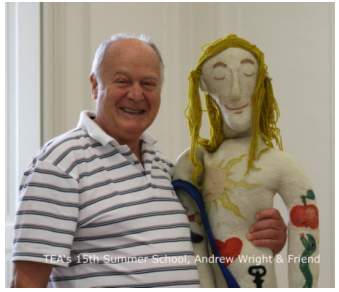
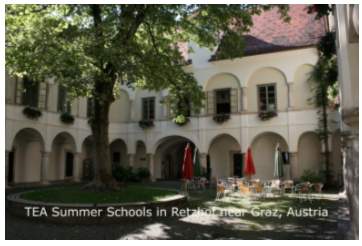
TEA offers a summer school program which takes place in late August for approximately four days with two native speaker trainers. This gives members the chance to meet other teachers to speak English as well as develop new skills for use in the classroom at a reasonable price and in Austria. Not many respondents had actually attended the program but those who did indicated that information on new trends and networking were the important reasons to do so.
In response to a question about what information should be provided on TEA’s website: www.tea4teachers.org, the following information was found important: workshops, conference information and information from the ELT News were the top three responses. Our monthly electronic newsletter should contain information about upcoming events, links to other interesting sites, future conferences and workshops in that order.
What solutions are available to TEA in order to increase membership and offer its members what they want and need? Most prominently mentioned in the questionnaire: the need to know about new trends and the need to network.
Increasing membership must go hand-in-hand with providing quality offerings. People need to be informed that such an organization exists and what it can do for them. We now feel it is important to reach teacher trainers in all parts of Austria. Teacher trainers and their institutions, whether university English departments or educational universities, need to encourage students to join (at reduced membership fees) as well as to encourage those who are doing their first teacher training year to join as well. This means closer collaboration between the TEA board and those institutions. Also different regions, other than Vienna and its surroundings – where the majority of TEA members are located - need to be informed and offered networking and continued educational opportunities in their regions.
It should also be possible to work hand-in-hand with publishing houses as they are, in general, interested in the networks that discuss their course books in both formal and informal atmospheres. Working with databases from various places may be a way to reach certain people electronically without the recipient feeling they have been “spammed”.
Most important is, however, the personal touch. People join TEA because someone else has told them about it and its benefits. That is usually how board members are found and at a recent English Teachers Day held by the Educational University of Vienna I was able to convince six people to join. It was not much, considering 140 people participated, but it was a start.
Publicity could also be a help as when people know more about an organization they are more likely to talk about it. We have also started a community on the Web2.0 site Xing. I hope that this article also produces interest in our organization and that those reading it become curious about what we are doing and check out our website: www.tea4teachers.org which we are trying to modernize as an additional step in helping meet the needs of our members. Discuss the article with others and then write to become a member at: office@tea4teachers.org. You won’t regret your decision.

Please check the From Teaching to Training course at Pilgrims website.


|